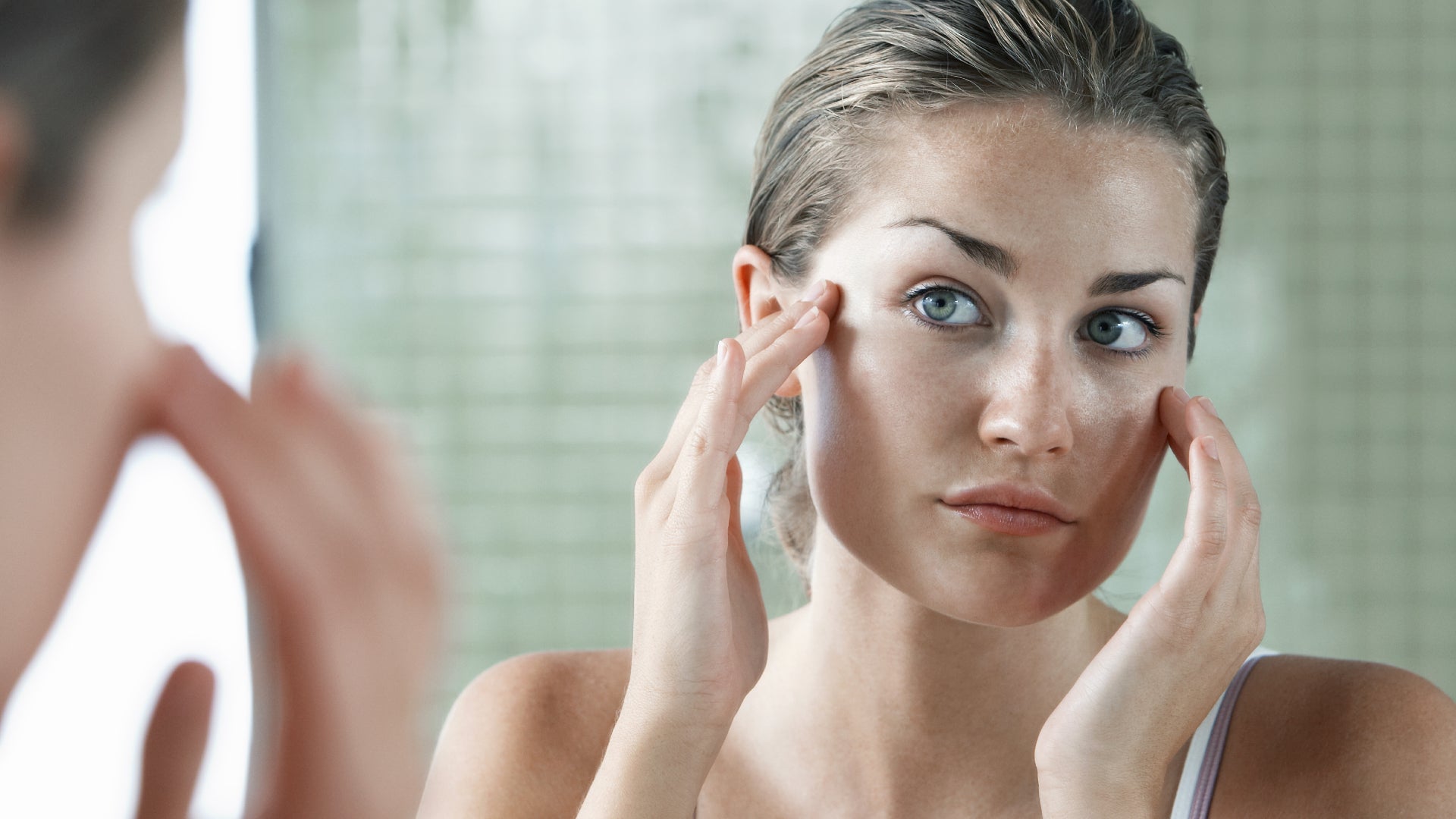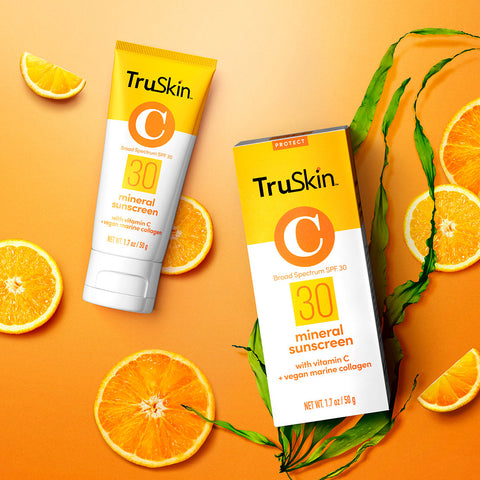
10 Reasons Why Your Skin Loves Vitamin C
The benefits of applying vitamin C to your skin go on and on. So, if you’re looking for a tried, tested and very much trusted ingredient to amp up your skincare regime, the search is over.
We don’t like to show favoritism, but vitamin C is a real golden child here at TruSkin. Packed into a ton of our awesome skincare products, it's an absolute powerhouse for protecting, brightening and strengthening your skin. But don’t take our word for it – herein, the facts…
1. Topical vitamin C is a fully signed up member of a family of ingredients called antioxidants. Antioxidants are vital for the look, feel and health of your skin because they work hard to fight free radical damage caused by environmental aggressors such as air pollution, smoking and that biggest offender of all, the sun.
Your body has its own natural antioxidant defense system, but as you get older, this becomes weaker, allowing those highly reactive free radicals to do a real number on the good stuff in your skin – namely collagen and elastin. This is why, if you want to keep your skin looking fabulous for as long as possible, you need to boost your levels of antioxidants, through awesome skincare ingredients like vitamin C.
2. It's not just vitamin C's antioxidant properties that are essential for preventing collagen and elastin breakdown, however. Its highly acidic nature also works hard to boost collagen and elastin production to help keep your skin plump, firm and supple. Take that, premature aging.
3. So, exactly how does this visibly benefit your skin? Gosh, where to start...
As you know, collagen and elastin are vital components of your skin, providing structure, strength and suppleness. When these proteins become compromised, your skin pays the price in many ways. Lines and wrinkles start to form and you may begin to notice areas of sagging, especially in the lower parts of your face where gravity is not your friend. Of course, your natural levels of collagen and elastin start to degrade as you hit your mid-twenties anyway and there’s nothing you can do about this natural aging process, but what you can do is fight against all the other damage at work.
Enter topical vitamin C. By fighting free radical damage it reduces the breakdown of collagen and elastin, making it one of the best anti-aging ingredients out there for helping you keep your youthful good looks for as long as possible.
4. Lines, wrinkles and saggy skin aren't the only things to be scared because vitamin C also helps improve dark spots and discoloration.
Vitamin C contains properties that help inhibit tyrosinase, an enzyme that generates melanin synthesis. Melanin is a complex polymer that’s produced by special cells called melanocytes and it's responsible for the color of your skin, hair and eyes. Everybody has the same number of melanocytes, but depending on your genes, yours will work at a different rate to the next person. If they produce a ton of melanin your hair, skin and eyes will be darker, whereas if they produce very little, they’ll be much lighter.
When you expose your skin to sunlight, melanin production goes into overdrive, making your skin tan. It can also become erratic, resulting in patches of dark skin, otherwise known as sun spots. And this is where topical C comes to the rescue. By regulating melanin production, vitamin C has the ability to gradually fade patchy, dark areas and even out your skin tone. Say hello to brighter, glowy skin. Yes!
5. Experts agree that vitamin C and sunscreen are a veritable power couple. Not only does vitamin C boost the efficacy of your sunscreen by offering your skin further protection from UV damage, but sunscreen helps prevent your vitamin C from oxidizing on your skin. Apply a vitamin C without sunscreen and it will just burn away, rendering it, well, pretty useless.
This is why sunscreen is vital. And sunscreen plus vitamin C? Even better.
6. Vitamin C comes in many guises on your skincare labels. Ascorbic acid is the purest form of vitamin C – but this can be pretty potent, especially if you have sensitive skin. Other forms to look out for include sodium ascorbate, ascorbyl palmitate, calcium ascorbate, magnesium ascorbyl phosphate and the mighty sodium ascorbyl phosphate.
7. Sodium ascorbyl phosphate is our vitamin C of choice. So, why do we believe in this form in particular?
Much gentler than its big, bad ascorbic acid cousin, sodium ascorbyl phosphate is a salt derivative of pure vitamin C and converts into ascorbic acid once it’s been applied to your skin. This process makes it much more tolerable and way less irritating for most skin types. But it still does a great job, of course. The saltiness is also why many of our vitamin C-enriched serums have a slightly cloudy look to them. Think about how water looks when you dissolve salt in it. It's cloudy, right?
8. Sodium ascorbyl phosphate is also much more stable when it comes into contact with light, air and water than pure vitamin C. It should always be packaged in an opaque or dark colored bottle, but still, this is great news because it means it doesn’t lose its potency after you’ve had it open for a few weeks.
9. So, what’s the best way to incorporate vitamin C into your routine? Well, you’ll find it in many of our skincare formulations including Vitamin C Brightening Cleanser, Moisturizer and Night Cream, but if you’re looking to pack the most powerful C-punch, serums are the way to go.
Serums like our awesome Vitamin C Super Serum+ are extremely effective at delivering active ingredients into the skin because they have a small molecular size (much smaller than moisturizers). This means they’re able to penetrate the skin deeper and quicker.
Just remember, always do a patch test to check for sensitivities before using any new product for the first time.
10. If you want to majorly up the antioxidant ante, look for serums that contain both vitamin C and vitamin E. Why? Because, like gin and tonic, these ingredients work perfectly well on their own, but they’re even better together. In fact, studies show the effectiveness of these antioxidants is almost doubled when they’re applied as a team. Furthermore, vitamin E helps stabilize vitamin C, ensuring you get the most bang for your buck.
Try our customer-favorite Vitamin C Facial Serum which is formulated with sodium ascorbyl phosphate (the cloudy C star), vitamin E and hyaluronic acid to help hydrate and protect your skin all-in-one bottle.




















